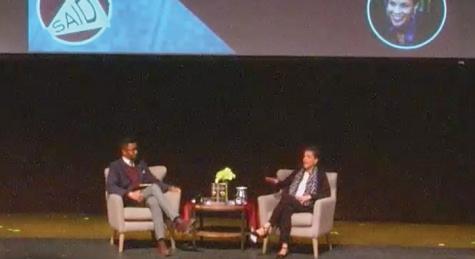
5 minute read
Collaborative Research Clusters
2019-2020
COLLABORATIVE RESEARCH CLUSTERS
Advertisement
The Collaborative Research Clusters give faculty the opportunity for a range of interdisciplinary research collaborations. These Research Clusters bring together scholars and practitioners from different disciplines, both within and beyond the Northeastern University community, around a shared concern. This interdisciplinary program facilitates productive discussions and collaborations among the participants, with a view toward the development of joint projects, conferences, publications, and/or major grant applications.
Learn more about Collaborative Research Clusters on our website
The Dragon Prayer Book
Convened by: Erika Boeckeler This research cluster brought together scholars from across the University for a Snell Library-wide exhibit on display in Fall 2019 that centered on an alternate reality game (ARG) showcasing and encouraging interaction with our research on the Dragon Prayer Book, Northeastern’s only medieval manuscript. The primary goal of this research cluster was to adapt our existing research – conducted over the past three years — on the text, music, provenance, and physicality of the prayer book, into a highly interactive Snell Library exhibit. This process will require ongoing, dialectical interdisciplinary exchange: everyone who participated in the various directions of the project was in conversation with the narrative designer — CAMD undergraduate Kieran Sheldon — in order to generate the specifics of the game and ensure that the game faithfully represents the Dragon Prayer Book team’s research and duplicates bibliographic methodologies. Dr. Celia Pearce, Associate Professor of Game Design at Northeastern, served as a creative advisor on this project. As part of her participation, Dr. Pearce made available to the project a new augmented reality app, the “Hidden Histories App,” created in CAMD’s game design program specifically for constructing game experiences around historical themes using archival documents. This app allowed the game to seamlessly interface with the manuscript and other historical materials to augment them with digital content. This is the first Snell exhibit of its kind and therefore a pilot project for future installations. We will be exchanging ideas with Dean of Libraries Dan Cohen and Facilities Manager Ethan Bren about the library as an interactive exhibit space and how this exhibit is part of the way Snell envisions its changing role and changing relationships to its holdings within a higher education system in flux.
Convened by: Doreen Lee This research cluster focused on the rapidly changing nature of everyday life, labor conditions, and social relations under the auspices of “new economies.” The term “new economy” has come to indicate a series of futuristic revolutions linked to neoliberal reform, access to venture capital, and development through technology. The growing ubiquity of start-up culture, self-entrepreneurship, and technological innovations are transforming social, urban, and financial landscapes across the world, impacting individuals and communities in uneven ways. From the individuals who are mired in debt as a result of new lifestyle patterns and expanded credit regimes to the powerful corporations that are consolidating their monopolies on basic goods and services, there are numerous examples of how technological innovations and legal-financial instruments restructure daily life. While the financial, technological, and real estate sectors connected to the new economy report astounding growth in value, individuals and communities are often caught in more ambivalent and precarious situations concerning their ability to work, find shelter, and aspire to social mobility. This cluster drew together the research expertise of faculty at Northeastern who are conducting research on these economic transformations, as seen in high-tech automated multinational ports in West Africa, post-industrial workplace relations in US cities, the freelancing precariat and its debt relations in Indonesia, and the contested emergence of an exploitable digital working class in Boston.
Convened by: Laurie Nardone The National Academy’s report on integrated interdisciplinary teaching identified substantial benefits of integration of humanities and arts with science, technology, engineering and mathematics (STEM) teaching. The report called for not only integrated interdisciplinary teaching but also institutional frameworks to support it and assessment methods to evaluate the benefits. With this report in mind, our research cluster investigated the foundations for developing, assessing, and ensuring sustainability of integrated interdisciplinary teaching. In the process, we applied for a Teagle Foundation Grant, which aims “to strengthen teaching and learning in the arts and sciences. To that end, we support concrete changes in curriculum, pedagogy, assessment, and faculty professional development that ultimately improve and enliven the educational experience of undergraduate students.” This interdisciplinary research cluster explored the efficacy of interdisciplinary teaching at Northeastern. Our cluster was predominantly interested in creating novel interdisciplinary courses that integrate humanities and the arts with STEM within core required courses, individual electives, and dual majors. Meaningful Measurement: Tools for Assessing Teaching
Convened by: Katy Shorey The purpose of this collaborative research cluster was to bring together researchers at Northeastern from across disciplines to investigate tools for measuring instructor effectiveness. Currently, student evaluations of teaching (SETs) are the primary tools for measuring instructor effectiveness. There is a large and growing literature documenting two major problems with SETs: (1) student evaluations of teaching demonstrate bias with respect to gender, race, as well as other factors unrelated to teaching (e.g. perceived age of the instructor, perceived attractiveness of the instructor, perceived difficulty of the course, whether the course is required/elective, time of day the course is scheduled, etc.) and (2) SET ratings don’t correlate strongly with student performance or student learning. These findings have motivated a national conversation about measurement of instructor effectiveness and the meaningfulness of statistical data collected from student evaluations. In response, there is a movement throughout higher education toward alternative measurement tools. This topic is both important and timely for Northeastern University, especially given this institution’s reputation for both research and teaching excellence. Our cluster aimed to (1) investigate the alleged problems with SETs and then (2) conduct a comparative evaluation of alternative measurement tools, considering their ability to supplement or replace SETs in departmental evaluations of teaching effectiveness.
Re/Producing the Urban
Convened by: Matthew Smith The focus of this interdisciplinary research cluster was to study the processes driving and shaping the production, reproduction, transformation, and deconstruction of urban spaces. Approaching this theme — and often just properly formulating the questions around it — requires collaboration across disciplines. Because there is no distinctive methodology for researching diverse phenomena at the urban spatial grain, a crucial task is to find strategies for fruitful, cross-disciplinary communication. Such strategies should both (1) facilitate knowledge transfer and (2) help participants to think across methodologies. This cluster aimed to develop such strategies, and consequently help to invigorate transdisciplinary collaboration.
Global Surveillance and Urban/Local Territories: a South-North Dialogue
Convened by: Daniel Noemi Voionmaa This research cluster studied the current practices of surveillance and their manifestations and impact at specific spaces (urban, suburban, and regional), with focus on the notions of security, capitalism, and eco-governmentality. It discussed the features of our society of control (and/or its beyond) and the characteristics of controlled or subdued territories. The cluster aimed to analyze cultural modes of resistance and transgressions that have emerged.










